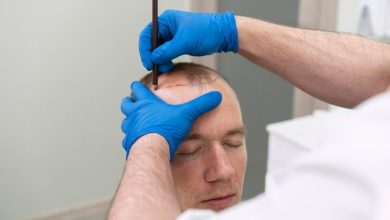5 Ways Low Testosterone Affects Men’s Overall Health

Testosterone is a hormone that is responsible for the development of male characteristics like muscle mass, bone density, and sex drive. It is a vital hormone that plays a crucial role in men’s overall health. However, when testosterone levels drop below normal, it can cause a silent threat that can affect men’s overall health. Low testosterone levels can cause fatigue, mood swings, low sex drive, and fertility issues. It can also increase the risk of developing conditions like diabetes, obesity, and heart disease. Unfortunately, many men are unaware of this silent threat and may be suffering from symptoms without realizing the root cause. In this article, we will explore the impact of low testosterone on men’s overall health and discuss ways to identify and treat this condition.
What is Testosterone and Its Importance in Men’s Health?
Testosterone is a hormone that is produced in the testicles. It is responsible for the development of male characteristics like muscle mass, bone density, and sex drive. Testosterone also plays a crucial role in the production of sperm. Testosterone levels are at their peak during puberty and early adulthood. However, as men age, testosterone levels naturally decline.
Testosterone is essential for men’s overall health. It helps to maintain muscle mass and bone density, which can help prevent osteoporosis. Testosterone also plays a crucial role in the development of male sexual characteristics like facial hair, deep voice, and sex drive. It is also responsible for the production of red blood cells, which can help prevent anemia.
Causes of Low Testosterone
There are many reasons why testosterone levels may drop below normal. Some of the most common causes include aging, obesity, and certain medical conditions. As men age, their testosterone levels naturally decline. This is a normal part of aging and is typically not a cause for concern. However, if testosterone levels drop too low, it can cause symptoms like fatigue, low sex drive, and mood swings.
Obesity can also cause low testosterone levels. Fat cells contain an enzyme called aromatase, which converts testosterone into estrogen. This can cause testosterone levels to drop and estrogen levels to rise. Certain medical conditions like hypogonadism, diabetes, and pituitary disorders can also cause low testosterone levels.
Symptoms of Low Testosterone
Low testosterone levels can cause a wide range of symptoms. Some of the most common symptoms include fatigue, mood swings, low sex drive, and fertility issues. Men with low testosterone levels may also experience a decrease in muscle mass and bone density, which can increase the risk of osteoporosis.
Low testosterone levels can also cause changes in sleep patterns. Men with low testosterone levels may have trouble sleeping and may experience insomnia. They may also have trouble concentrating and may experience memory problems.
Health Risks of Low Testosterone
Low testosterone levels can increase the risk of developing a wide range of health conditions. Studies have shown that men with low testosterone levels are more likely to develop conditions like diabetes, obesity, and heart disease. Low testosterone levels can also increase the risk of developing osteoporosis, which can cause fractures and other bone-related problems.
Low testosterone levels can also affect mental health. Men with low testosterone levels may experience depression, anxiety, and mood swings. They may also experience a decrease in energy levels, which can cause fatigue and lethargy.
Diagnosis of Low Testosterone
The diagnosis of low testosterone levels typically involves a blood test. A doctor will measure the amount of testosterone in the blood to determine if levels are below normal. If testosterone levels are low, a doctor may perform additional tests to determine the underlying cause.
Treatment Options for Low Testosterone
There are several treatment options for low testosterone levels. Testosterone replacement therapy and taking a natural testosterone supplement daily are two of the most common treatments. Testosterone replacement therapy can be administered through injections, patches, gels, or pellets. It can help improve energy levels, mood, and sex drive.
However, testosterone replacement therapy is not without risks. It can increase the risk of developing prostate cancer and can cause other side effects like acne, hair loss, and breast enlargement. It is important to discuss the risks and benefits of testosterone replacement therapy with a doctor.
Lifestyle Changes to Improve Testosterone Levels
There are several lifestyle changes that men can make to improve testosterone levels. Regular exercise can help increase testosterone levels. Resistance training, such as weightlifting, can also help improve muscle mass and bone density.
A healthy diet is also essential for maintaining healthy testosterone levels. A diet rich in protein, healthy fats, and low in processed foods can help improve overall health and raise testosterone levels. Getting enough sleep is also important for maintaining healthy testosterone levels.
Supplements to Boost Testosterone
There are several supplements that can help boost testosterone levels. D-aspartic acid is a supplement that has been shown to increase testosterone levels in men. Zinc and vitamin D supplements can also help improve testosterone levels.
However, it is important to be cautious when taking supplements. Some supplements can interact with medications and cause adverse side effects. It is important to talk to a doctor before taking any supplements.
Conclusion
Low testosterone levels can cause a silent threat that can wreak havoc on men’s overall health. It can cause a wide range of symptoms like fatigue, mood swings, low sex drive, and fertility issues. It can also increase the risk of developing conditions like diabetes, obesity, and heart disease. If you are experiencing symptoms of low testosterone, it is important to talk to a doctor. They can perform tests to determine low testosterone levels and can recommend treatment options. Making lifestyle changes like regular exercise and a healthy diet can also help improve testosterone levels. Overall, it is important to be aware of the impact of low testosterone on men’s overall health and take steps to maintain healthy testosterone levels.




